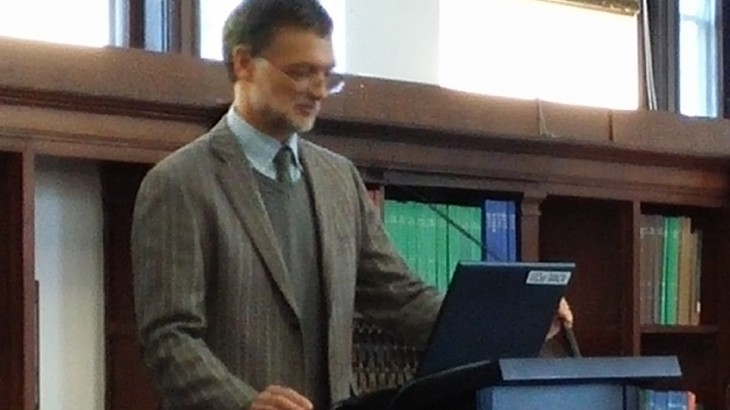The EIUI was pleased to invite Mr. Marc Taconet of the Food and Agriculture Organization of the United Nations (FAO) to participate in the Dalhousie University Information Management Public Lectures series on 8 October 2015. Mr. Taconet is the Chief of the Statistics and Information Branch of the Fisheries and Aquaculture Department of FAO and is based in Rome, Italy. Mr. Taconet has been working with FAO since 1987 where he has led the development of global fisheries information management tools and initiatives to network fisheries information producers and users. He is currently the Secretary of the Fisheries and Resources Monitoring System, which provides global access to a wide range of information on the status of fishery marine resources.
Mr. Taconet was in Halifax attending the annual meeting of the Advisory Board of the Aquatic Sciences and Fisheries Abstracts (ASFA). ASFA is an international cooperative information system for the collection and dissemination of information covering the science, technology, and management of aquatic environments. Information on EIUI’s participation in this ASFA meeting is provided at this link.
In his lecture, “iMarine in Support of FAO’s Blue Growth Initiative: The Information Requirements,” Mr. Taconet described the role of the data infrastructure and institutional partnerships designed to meet the Sustainable Development Goals (SDGs) set by the United Nations. In order to address the SDGs, the FAO recently launched its Blue Growth Initiative to assist countries in developing and implementing the blue economy and growth agendas discussed at the 2012 Rio+20 Conference. The blue economy and growth concept emphasizes conservation and sustainable management, based on the premise that healthy ocean ecosystems are necessary to maintain ocean-based economies.
According to Mr. Taconet, the key challenges for the promotion of the Blue Growth Initiative include the need for fact-based decision making across multiple scientific and social science disciplines and the need to be responsive to changing circumstances. FAO is working on a global data framework for Blue Growth in order to promote the availability of data and connect information and knowledge sources, e.g., statistics, databases, websites, and publications, from multiple information domains and geographic scales. Partnerships and networks are being used to collect, standardize, share, monitor, and to develop collaborative information technology (IT) infrastructures. A data infrastructure, such as iMarine, can address such challenges and facilitate partnerships thereby moving the global blue growth agenda ahead.
The iMarine data infrastructure is expected to meet practitioner needs for fisheries management and implementation of the ecosystem approach to fisheries management (EAF). This infrastructure is an IT supported platform that facilitates cost-efficient integration of resources, e.g., hardware and software, and enables mobilization of expertise under a governance mechanism. The iMarine Board is comprised of a range of experts from the various domains of EAF joining together as a community of practice. In addition, iMarine aims at developing collaborative science through virtual research environments. Beyond the technological component, uptake of iMarine requires the development of a comprehensive sustainability plan, including governance, data policies, marketing, outreach, and capacity building.
An audio recording of Mr. Taconet’s lecture, accompanied by his presentation slides, is available on the website of the School of Information Management.
